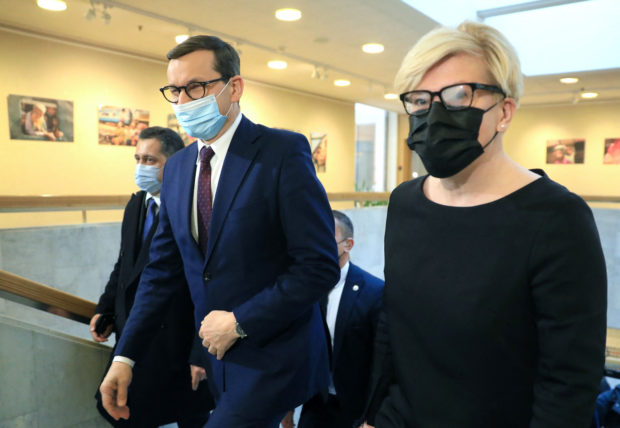Poland likens border crisis to Cold War destabilization

Lithuania’s Prime Minister Ingrida Simonyte (R) and Poland’s Prime Minister Mateusz Morawiecki (L) arrive to address a joint press conference during their meeting on the migrant crisis on the Polish border with Belarus, in Vilnius on November 21, 2021. AFP
Divert attention
Brussels and NATO have also described the migrant crisis as a “hybrid tactic”, meaning a combined military-political operation. “Today on Poland’s eastern border we are facing a new type of war, a war whose weapons are migrants and disinformation — a hybrid war,” Morawiecki said in Estonia. The Polish PM visited the Baltic states, two of which also border Belarus, on Sunday. His Lithuanian counterpart Ingrida Simonyte told reporters “we need to increase pressure on the Minsk regime”. Morawiecki said he will visit other EU capitals this week to urge Western allies “to not let the particular problems currently being discussed between us in Brussels overshadow the gigantic real risks emerging on the horizon”. Some observers say Poland is exploiting the border issue to distract from controversial reforms that the EU believes limit the independence of the judiciary. The European Commission wrote to Poland on Friday to launch a process that could lead to the withholding of funds over the issue. “While the problem on Poland’s border is serious and requires Western solidarity — for example by sanctioning Belarus — Morawiecki blows it out of proportion,” political expert Marcin Zaborowski told AFP. The policy director at the Globsec think-tank argued that the Belarus action “pales in comparison with the war in Ukraine, cyber attack in Estonia in 2007 and Russian support for far-right extremism in Europe”.Migrant deaths
On Sunday, Poland’s border guards reported new attempted crossings, including by some 100 “very aggressive” migrants. Poland’s Defence Minister Mariusz Blaszczak said he expected the border showdown to last months. Carrying Polish flags, the far-right held a small rally in the city of Bialystok to thank troops for protecting the border. According to an opinion poll released Sunday by the Rzeczpospolita daily, more than 55 percent of Poles are worried the crisis could lead to all-out war. The migrants, many fleeing war and poverty, have spent thousands to fly into Belarus on tourist visas. Once at the border, they are faced with squalid, freezing conditions. Polish media say at least 11 migrants have died since the crisis began over the summer. A Yemeni migrant was laid to rest on Sunday in the Polish village of Bohoniki, with his brother in attendance. Yemen’s foreign ministry said he died “as a result of the severe drop in temperatures”. The burial was organised by Bohoniki’s tiny Muslim community, mostly descendents of the Tatars who came to the area centuries ago. “I fear there will be more burials soon,” local Muslim leader Maciej Szczesnowicz told AFP. The Belarusian health ministry said a World Health Organization mission had arrived to help organise medical support for the migrants.
READ NEXT
EDITORS' PICK